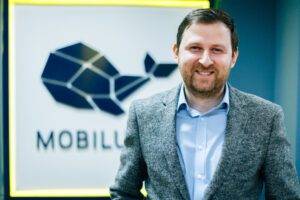
Providing dedicated tech talent and instant solutions to businesses
As a global provider of remote, dedicated development teams and R&D centres to clients across various industries, Mobilunity bridges the gap between ideas and making concepts happen.
CEO, Cyril Samovskiy shares his Secrets of Success with Business Matters.
What service does Mobilunity provide and how does it work?
We offer a nearshoring service that provides dedicated development teams to clients across various industries and technology stacks, including Insurtech, Fintech, IoT, Embedded software, and more. With access to a talent pool of over 200,000 Ukrainian software engineers – not counting our capacities in other Eastern European countries – each team member we provide is exclusively dedicated to our clients’ projects and has no other commitments to other projects, ensuring full focus. Our clients benefit from outstanding development capabilities, team size and structure flexibility, lower costs, and complete control over their development teams.
What problems does your company solve?
We address a critical challenge that businesses face regarding their tech talent needs, both in the long-term and short-term, whether in a specific technological stack or a specialised business domain. The core problem we solve for our clients revolves around their inability, and at times, their intentional choice not to solve these challenges internally.
The root of this challenge often stems from limitations within the local labour market. These constraints could manifest as extended recruitment agency timelines to find and place the right candidate or the necessity of engaging particular talents for a very brief duration.
To tackle this, our solutions are designed to be adaptable. We provide options for establishing technology teams in nearshore locations or within the UK, working collaboratively as part of a client’s in-house team, or maintaining an outsourced relationship with us as the vendor. This flexibility ensures that our clients can tailor our services precisely to their unique needs, whether they require long-term support or short-term specialised expertise.
What type of businesses do you work with?
Fortunately, we have a very diverse list of clients – from early stage startups that have just a few co-founders on board, to well-established corporations operating globally, with a 10,000+ headcount. However, we find it is the startups that have some form of advanced technology supporting their business concept that align most closely with our own mindset. Typically such clients are fast decision makers, they aim to leverage the most contemporary technology, and they have a big idea behind their plans. Our capacity to empower such businesses and show an immediate impact stands slightly above other types of client organisations.
What is your USP?
We work in a very competitive industry, so standing out requires clear differentiation. With our primary focus being on remote technology team services, we like referring to the ‘3Rs’ of successful remote team setup: Recruiting, Retention and Relationships. These three priorities, or USPs, guide our operations and streamline our proposals, ensuring our proposal is short, sharp, clear and well differentiated.
What are your company values? Have you ever had them challenged and if so, how have you dealt with it?
As we have grown and developed, our values have evolved. We tend not to focus on our past achievements because both the business environment and our clients are evolving rapidly. Therefore, we must also evolve to meet these changing demands.
After Covid, we continued growing fast, introducing new and more diverse business models into our offering. Right now we work to the following company values. These define what we are, what you may expect from us, and what we will be once and if you work with us:
Transparency. Having 40+ clients from 10+ countries, we basically operate with a set of 40+ processes. We pride ourselves in the ability to effectively manage that, and without transparency being a first requirement to how we operate (with the client, with our tech teams, with our employees and partners) we would not be capable of being where we are now. As such, transparency lies in every significant process we have in place.
Growth. Related to both our clients, and to our own staff, we basically exist to make everything that we touch grow. This defines the types of clients that mostly come to us – the main driving factor they have in mind is their intent to grow (whether that’s to grow fast, grow stable, or grow to where the company would not have been without us).
Flexibility. While this was always a focus for us, recent years in business have highlighted the importance of flexibility. Financial crises, growth and drop in demand, new regulations in the digital world, pandemia with its “all remote” setups, and war in Ukraine – these all prove this value is a fundamental essence for our business and our models to be sustainable and have a future.
How do you ensure that you recruit a team that reflects your company values?
Given that recruiting is one of our core offerings, we naturally place a special emphasis on how we recruit for our own company. Our 13 years of experience have taught us valuable lessons, and we’ve identified rules and practices that have proven effective during this time. They are:
A big chunk of our best people grew up in our company, from the very entry level roles to the highest existent positions where they are now.
A mix of “self-grown” and “external” key people ensures our Company grows in a way we expect.
In the long run, soft skills take precedence over hard skills. While hard skills alone may suffice for short-term engagements, it’s the soft skills that enable individuals to manage and leverage those hard skills effectively over time.
While you may not see our values in these three basic tips, if we overlay our business values onto these guidelines, they align more harmoniously. As we continue to grow, we must balance our immediate need for top-notch professionals and our strategic goal of cultivating a talent pool for the future. Our company-wide recruiting strategy essentially outlines how we intend to achieve this alignment and ensure the successful ‘3+3’ match between skills and values.
Are you happy to offer a hybrid working model of home / office post covid?
A big part of our service offering is tech talent from all over the world remotely. Thus, we would not be honest with ourselves and our clients if we were not big fans of this model. Only 10% of our own staff show up to the office on a periodical basis. We do not demand it, for most roles, and we do not expect it, anymore. Instead, we learned how to remain effective; we traded some of the meetings to asynchronous channels of communication; and we invested heavily into the skill of proper goal setting, performance management and professional development. Why on Earth would we confine ourselves to the traditional office-only model when we’ve gained a competitive edge in the labour market? We possess skills that are in high demand, and we offer these skills as a service to our many clients who are eager to gain a similar advantage.
Any finance or cash-flow tips for new businesses starting out?
I won’t be too unique in these – a successful business starts with sufficient funding, a plan to generate revenue and hope that things will go more or less as they were planned. I myself dislike the idea of bringing in someone else’s money into something you yourself can build and/or fund, though I know many businesses (our clients inclusive) who were capable of building something great and huge purely because they were smart enough to attract the right external investment. I’ve also witnessed instances where entrepreneurs, in their pursuit of rapid growth and the necessary funding to achieve it, ended up losing sight of their original dream company and their personal motivation to work within it.
That said, my advice would be to carefully weigh up the necessity of external investments when starting your business. While external funding can make some aspects easier, it often comes with its own set of challenges that you might not have encountered if you were self-funding your startup.
If you could ask one thing of the government to change for businesses, what would it be?
If I could request one change from the government to benefit businesses, it would be to facilitate the seamless integration of global talent into local businesses. I understand that not every business needs this, but I’m specifically referring to those enterprises designed to grow on a global scale and compete with international players. The current limitations on working with a global talent pool put local businesses, especially startups, at a significant disadvantage. As long as a candidate’s location remains a major factor in shaping HR strategies for businesses, this constraint will continue to hinder the potential for innovation, efficiency, and the globalisation of these companies.
It’s important to note though that there are other aspects to these constraints, and while I acknowledge one here, I recognise that there may be additional dimensions to consider.
What’s your attitude towards your competitors?
We respect and learn from each other, I know for a fact they look at us and do the same. I am good friends with slightly smaller and slightly bigger companies in our domain, and we meet 2-3 times a year to exchange news and observations, while understanding the information we share might empower our counterpart.
There are 3-5 quite big players and there are 2-3 very dynamically growing companies that permanently stay on our radar. I would not be able to name any that I think beats us in our niche markets, but of course every company has their own strengths and weaknesses, and knowing them helps us become a better vendor to our clients, and win the battles for the client on the presale stage.
Do you have any tips for managing suppliers or customers effectively?
As a service provider, we could write a book on what to do and what not to do with suppliers. In our industry specifically, we recommend following a few principles that make the supplier choice easier and more streamlined:
Size does matter. Your vendor’s size should be a match to your project size or else too many risks arise.
Transparency ensures delivery. The more your supplier and vendor knows in terms of what you expect, how you need it, and why – the higher the chances of you getting what you’re seeking. You do not want your vendor to be guessing what’s on your mind.
While building relationships requires resources, if you aim to establish enduring partnerships with your vendors, there’s no alternative but to invest in building and nurturing these relationships.
In terms of our customers, things are simpler, as our business grows when they grow. Not a tip, rather a fact. Meaning that we are so lucky to be in a business whereby we do not need to choose whose side to play.
Any thoughts on the future of your company and your dreams?
During our 13 year business journey, we’ve encountered various shifts in direction and have contemplated where our path may lead in the future. This experience reinforces our belief in maintaining our core competencies- HR and technology – as the foundation for our future endeavours as a company.
I am confident we will be able to open the world of remote talent to more and more global and local businesses, offering wider and deeper expertise within the fields of tech teams foundation, management and performance.
My dreams for the business’ future are closely linked to global economic growth and prosperity. I firmly believe that as technology takes on more fundamental tasks trusted by humanity, the role of technology should be to assist humans rather than exert undue control. This shift will create a growing demand for the services we provide to our clients, as we genuinely believe our offerings contribute to making the world a better place.
Read more:
Secrets of Success: Cyril Samovskiy, CEO of Mobilunity





